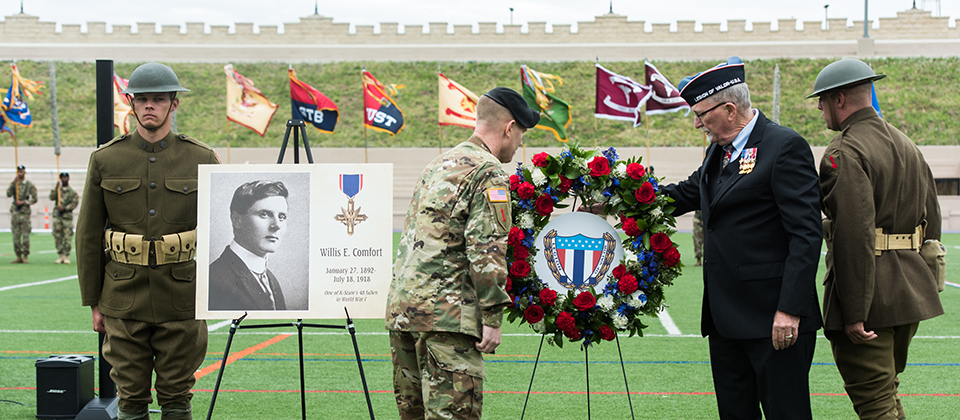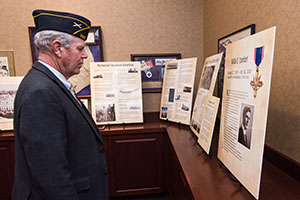WWI Memorial Stadium Dedication

‘A story that needed 100 years to tell’: World War I Memorial Stadium formally dedicated
— Ashley Pauls
The story of Kansas State University’s 48 fallen — the K-Staters who lost their lives
in World War I — is no longer a lost chapter in history. The 48 fallen were honored
and K-State’s World War I Memorial Stadium was officially dedicated in a formal ceremony
on April 21.
“This has all been lost in our history,” K-State President Richard B. Myers ’65 addressed the crowd gathered in the stadium for the ceremony. “Memorial Stadium was never (fully) completed, and the dedication of this veterans’ memorial was placed on hold and then never conducted. Today, 94 years later, and on the nation’s 100th anniversary of its involvement in the Great War, World War I, we assemble to complete that history.”
Construction on Memorial Stadium began in the early 1920s, and the facility was designed to serve as a memorial to the 48 K-Staters who sacrificed their lives during World War I. However, the stadium was never fully completed based on the original designs, as funding dried up and the Great Depression loomed, and recent research revealed that the stadium was never formally dedicated.
This history might have remained lost, if not for the work of K-State alumnus Jed Dunham ’96. One day as he was visiting K-State, he found a plaque at Memorial Stadium honoring the 48 fallen. Intrigued, he snapped a quick photo and decided to research the fallen. Yet, he found the information was not easily available. Dunham then went on a personal quest to uncover their stories. The Alumni Association responded to his request for help and coordinated efforts to identify K-State resources who supported his research on Memorial Stadium.
It was through this research that Dunham discovered the stadium was never officially dedicated. Once informed of this fact, the President’s Office, Office of Military Affairs and the Alumni Association set out to amend the oversight.
As he spoke at the ceremony, Dunham called the stories of the 48 fallen fascinating and beautiful and sad. Some of them were star athletes at what was then known as Kansas State Agricultural College. Others had promising careers cut short. All deserve to be remembered for their sacrifice.
“The stories of the 48 fallen are tremendously valuable,” Dunham said. “They explain the American experience in the First World War. And each one of their names represents an individual who lived a life, who had loved ones, whose nation called them to service. They answered the call, and these 48 K-State students did not come back.”
The dedication ceremony at World War I Memorial Stadium drew a crowd that included K-State administration and staff, members of the community, and relatives of the 48 fallen. The dedication also featured the Fort Riley Color Guard and First Infantry Division Band, and historical reenactors in World War I uniforms.
 The K-State Alumni Association — which played a role in the Memorial Stadium narrative
when the Alumni Center was completed in 2002 and filled in the original horseshoe
design — hosted a special exhibit in the Alumni Center’s Memorabilia Room highlighting
artifacts and information about the stadium and World War I.
The K-State Alumni Association — which played a role in the Memorial Stadium narrative
when the Alumni Center was completed in 2002 and filled in the original horseshoe
design — hosted a special exhibit in the Alumni Center’s Memorabilia Room highlighting
artifacts and information about the stadium and World War I.
 The ceremony concluded with the revelation of new signage recognizing Memorial Stadium’s
status as a World War I memorial — immortalizing the sacrifice of the 48 fallen for
many years to come. Relatives of the 48 fallen gathered for a photo near the new signage.
This group included the family of Howard Wood: Pauline “Polly” Wood Ferrell ’53 (niece),
Molly Ferrell Smith ’82 (great-niece), Jannette (great-niece) and Richard Willacker,
and David (second cousin) and Gerry Thurston; family of George Wingate: Bill Wingate
(grandson), Jim ’64, ’68 (stepson) and Jill Weixelman, and Bernadine Weixelman (stepdaughter);
family of Joe Speer: Susan (great-niece) and Frank Newman; along with other extended
family members.
The ceremony concluded with the revelation of new signage recognizing Memorial Stadium’s
status as a World War I memorial — immortalizing the sacrifice of the 48 fallen for
many years to come. Relatives of the 48 fallen gathered for a photo near the new signage.
This group included the family of Howard Wood: Pauline “Polly” Wood Ferrell ’53 (niece),
Molly Ferrell Smith ’82 (great-niece), Jannette (great-niece) and Richard Willacker,
and David (second cousin) and Gerry Thurston; family of George Wingate: Bill Wingate
(grandson), Jim ’64, ’68 (stepson) and Jill Weixelman, and Bernadine Weixelman (stepdaughter);
family of Joe Speer: Susan (great-niece) and Frank Newman; along with other extended
family members.
The “story that needed 100 years to tell,” as Dunham calls it, has finally come to an end.
“If you’re a K-Stater, this has to be meaningful to you,” Myers said. “If you’ve been in the military, this is very meaningful to you because we’re finally bringing to a close a chapter that was open but never officially closed.”
